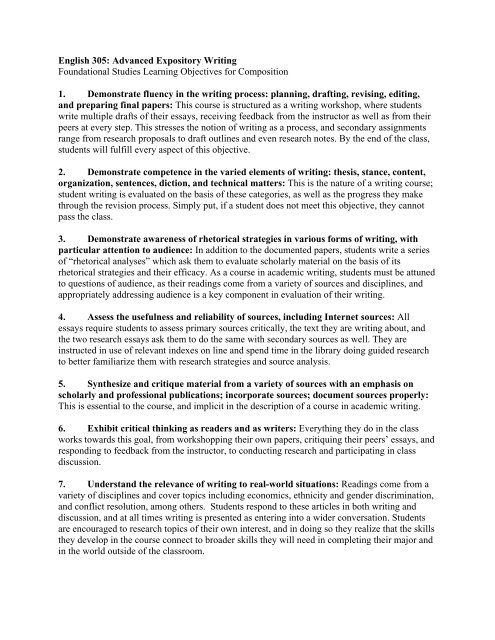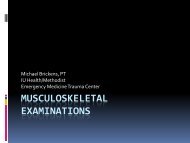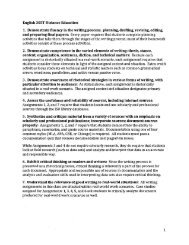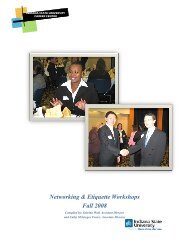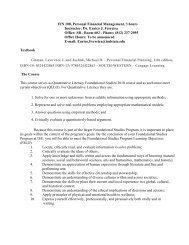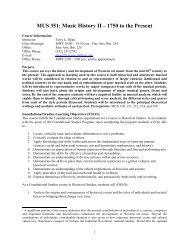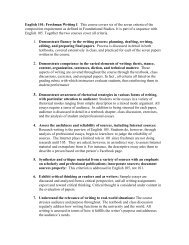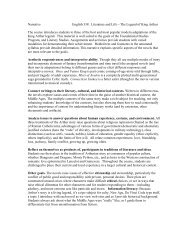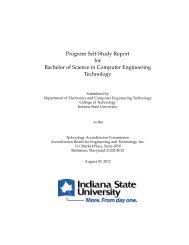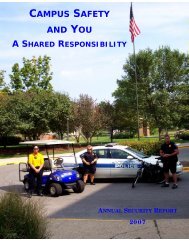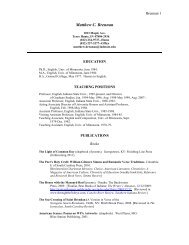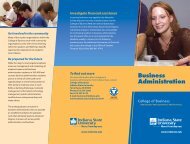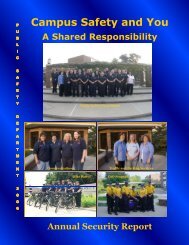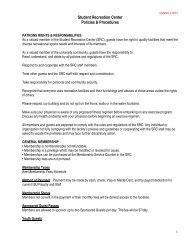ENG 305 - Indiana State University
ENG 305 - Indiana State University
ENG 305 - Indiana State University
Create successful ePaper yourself
Turn your PDF publications into a flip-book with our unique Google optimized e-Paper software.
English <strong>305</strong>: Advanced Expository Writing<br />
Foundational Studies Learning Objectives for Composition<br />
1. Demonstrate fluency in the writing process: planning, drafting, revising, editing,<br />
and preparing final papers: This course is structured as a writing workshop, where students<br />
write multiple drafts of their essays, receiving feedback from the instructor as well as from their<br />
peers at every step. This stresses the notion of writing as a process, and secondary assignments<br />
range from research proposals to draft outlines and even research notes. By the end of the class,<br />
students will fulfill every aspect of this objective.<br />
2. Demonstrate competence in the varied elements of writing: thesis, stance, content,<br />
organization, sentences, diction, and technical matters: This is the nature of a writing course;<br />
student writing is evaluated on the basis of these categories, as well as the progress they make<br />
through the revision process. Simply put, if a student does not meet this objective, they cannot<br />
pass the class.<br />
3. Demonstrate awareness of rhetorical strategies in various forms of writing, with<br />
particular attention to audience: In addition to the documented papers, students write a series<br />
of “rhetorical analyses” which ask them to evaluate scholarly material on the basis of its<br />
rhetorical strategies and their efficacy. As a course in academic writing, students must be attuned<br />
to questions of audience, as their readings come from a variety of sources and disciplines, and<br />
appropriately addressing audience is a key component in evaluation of their writing.<br />
4. Assess the usefulness and reliability of sources, including Internet sources: All<br />
essays require students to assess primary sources critically, the text they are writing about, and<br />
the two research essays ask them to do the same with secondary sources as well. They are<br />
instructed in use of relevant indexes on line and spend time in the library doing guided research<br />
to better familiarize them with research strategies and source analysis.<br />
5. Synthesize and critique material from a variety of sources with an emphasis on<br />
scholarly and professional publications; incorporate sources; document sources properly:<br />
This is essential to the course, and implicit in the description of a course in academic writing.<br />
6. Exhibit critical thinking as readers and as writers: Everything they do in the class<br />
works towards this goal, from workshopping their own papers, critiquing their peers’ essays, and<br />
responding to feedback from the instructor, to conducting research and participating in class<br />
discussion.<br />
7. Understand the relevance of writing to real-world situations: Readings come from a<br />
variety of disciplines and cover topics including economics, ethnicity and gender discrimination,<br />
and conflict resolution, among others. Students respond to these articles in both writing and<br />
discussion, and at all times writing is presented as entering into a wider conversation. Students<br />
are encouraged to research topics of their own interest, and in doing so they realize that the skills<br />
they develop in the course connect to broader skills they will need in completing their major and<br />
in the world outside of the classroom.
Dr. Wurtz (jwurtz@isugw.indstate.edu) <strong>ENG</strong> <strong>305</strong><br />
Office: Root A-207<br />
Root A110<br />
Office Hours: MW 3 - 4:30, Th 9:30 - 11 and by appt. MWF 11:00 - 11:50<br />
Phone: 237-3135 (Office)<br />
232-6769 (Home; not after 9 pm please)<br />
This Syllabus is also available online, linked through Blackboard.<br />
Advanced Expository Writing: Writing Communities<br />
exΑposiΑtory (-tôr, -tr) adj.:<br />
1. A setting forth of meaning or intent<br />
2. A. A statement or rhetorical discourse intended to give information about or<br />
an explanation of difficult material.<br />
B. The art or technique of composing such discourses.<br />
While the term “expository” may not be familiar to you, you have already been doing expository writing<br />
throughout your college career in the form of research papers, business memos, or lab reports. This may<br />
be the first time, however, that you are taking a class solely dedicated to practicing and developing your<br />
writing skills. In the definition above, there are two other terms that you will come to be familiar with as<br />
the semester progresses. The term “rhetorical” implies argument, and that is our primary focus. This<br />
course aims to help you learn how to craft an argument based on different sources of information,<br />
concentrating on a general set of reasoning strategies that you can use to persuade an audience. Since we<br />
will be concentrating on argument throughout the semester, this is basically a course in rhetoric. Rhetoric<br />
is the art of discovering what to say and using language to share what people know, believe, and value<br />
(and if you've read Plato, you know that rhetoric is in no small way bound up with the idea that you use<br />
this language to bring your audience to a new position or point of view). Thus, rhetoric provides a way to<br />
think about writing as part of a conversation that aims to bring about understanding of various sides of an<br />
issue, and perhaps, agreement. 1<br />
The second term to pay attention to in the above definition is “discourse”. Now, you may or may<br />
not know this term, but you navigate a number of discourses every day as you move between different<br />
classes, as you read, watch television, have conversations with friends, family, or roommates and<br />
complete assignments. We’ll talk more about “discourse” and what that means throughout the semester,<br />
but one understanding of “discourse” is a back and forth communication of thought by words; talk,<br />
gestures, conversation, essay, dissertation, treatise, sermon, etc. “Discourse” implies a sharing of ideas.<br />
Using the word “discourse” presumes an intellectual component is involved in the interaction. Note here<br />
that conversation and interaction are the keys to this term. In this sense, “discourse” is fundamentally tied<br />
up with a notion of community, a group of people exchanging thoughts and ideas, and is one key way in<br />
which we can understand how a community works. Our readings this semester will explore a variety of<br />
discourses as they analyze different communities and present their arguments in academic articles. As we<br />
read and discuss, then, our readings will complement our writing as we seek to improve our critical<br />
thinking, “discourse-navigating”, and academic writing skills. 2<br />
This course is a writing class, which means (surprise, surprise) you will be expected to write<br />
regularly. There are six required assignments for grades: (1)a "framed" argument arising out of issues<br />
you see in readings from the course reader; (2) an argument based on library research; (3) an analysis of<br />
traditional and Rogerian approaches to argument (don't worry, you'll know what this means when we get<br />
there); (4) a research proposal for the final paper; (5) an argument incorporating library and original<br />
1 Fulfills FS objectives 3, 6 and 7.<br />
2 Fulfills FS objectives 2, 6 and 7.
esearch; and (6) three rhetorical analyses (one paragraph writing assignments) to be handed in over the<br />
course of the semester. In addition, there may be some (short) informal writing assignments asking for<br />
responses to readings, exercises, and questions, etc. 3<br />
Course Objectives and Expectations: 4<br />
In short, this course provides continuous practice in the processes of writing and speaking. This practice<br />
will help you hone your critical thinking, reading, and writing skills. This fulfills the Foundational Studies<br />
requirement for Composition at the Junior level.<br />
critical reading objectives<br />
! the ability to identify a writer’s line of argument as well as the rhetorical techniques (s)he uses to make the<br />
argument<br />
! to evaluate the claims a writer makes in light of the evidence given to support those claims<br />
! to identify the basic assumptions underlying a writer’s argument<br />
! to examine what a writer has left unsaid<br />
! to evaluate the implications of an argument<br />
To develop these critical reading objectives, you will write three (3) rhetorical analyses of<br />
selected readings. These will count as a part of your final portfolio grade, graded on a basis of<br />
improvement over the year rather than on an individual basis.<br />
writing objectives<br />
! identify an issue amidst different and conflicting points of view in what you read<br />
! frame and sustain an argument that not only includes both the analysis and exposition of information but<br />
establishes what is at stake in accepting your view(s)<br />
! provide relevant evidence to support a given point of view<br />
! identify and analyze potential counter-arguments<br />
! develop an argument that proceeds logically, taking into account the needs of a particular audience<br />
! learn to identify good questions for research<br />
! develop more advanced skills for research, including library resources<br />
! develop and support a clearly stated thesis<br />
! practice academic writing at an advanced level<br />
You will be expected to write weekly, preparing multiple drafts of your essays and revising them.<br />
In turn, you can expect to get ample feedback from me as well as from your classmates.<br />
This class is designed around the notion that writing is a way to enter into the conversation of the<br />
academy. Even if you don’t see yourself as becoming an academic, you have spent a significant portion<br />
of your life in the academy, and you are now considered an “advanced” member of the community, so<br />
learning how to fully join the conversation is imperative. In accordance with this understanding of<br />
writing, the course is structured as a writing workshop, which means you will work in permanent groups<br />
(or communities) of three to five students. For each portfolio, you should expect to write at least three<br />
drafts as you compose your argument. Each successive draft should have substantial revisions. When<br />
your groups come together to discuss your writing, you should bring photocopies of your work--enough<br />
for everyone in your group and one for me as well. An important part of the course entails learning how<br />
to respond to drafts in various stages of development; this is one way to develop your critical reading<br />
skills. There will be more information on your groups and on what you will be expected to do in your<br />
groups in the first few classes.<br />
3 Fulfills FS Objectives 1-7.<br />
4 These are my personal objectives for the class; they overlap with and expand on the FS objectives. Rather than<br />
highlight everything in this section, I will simply note that FS objectives 1-7 are fully covered here.
Expectations<br />
This is designed to be a rigorous course, with plenty of reading and writing assignments. You<br />
will be expected to have all reading completed by the day on which we will be discussing it, and to have<br />
all writing completed by the day it is due--that means that drafts are to be completed by the first day they<br />
are workshopped, and portfolios are due on the designated day. Portfolios will be penalized one letter<br />
grade per day for each day they are late. In turn, I will return your work to you in a timely fashion, with<br />
plenty of commentary. Your groups will lead discussion of a reading once during the semester. You<br />
should take notes when appropriate, and at all times during class, you are expected to be respectful of<br />
your colleagues and me. Of course I am always available to talk during office hours, and I am more than<br />
willing to set up individual appointments if you can’t make it to my hours. All assignments are to be<br />
typed, double-spaced, with 12 point font and 1-inch margins unless otherwise noted.<br />
Attendance<br />
This class is conducted as a seminar, so that students are expected to speak, to listen, and to<br />
contribute. Therefore, regular attendance is required. Further, the workshop structure of the course<br />
necessitates your active presence and participation to help your fellow classmates with their writing.<br />
Because it’s hard to plan not to get a flat tire or the flu that everyone in the dorm has had twice, you may<br />
miss three classes without penalty, however, each non-workshop class you miss after three absences will<br />
deduct 3 points from your final grade. As the workshop experience is the backbone of the class, for each<br />
missed workshop session (after your third absence), 6 points will be deducted. You are responsible for<br />
missed work due to absence. If you know you are going to have to miss a class, please notify me ahead of<br />
time via phone or email. Excused absences will be allowed only in the cases of severe illness, death of an<br />
immediate family member, and duties performed for the <strong>University</strong> (e.g. athletics, ROTC, etc). In these<br />
cases, a letter of verification is required, and advance notice is appreciated.<br />
Grading<br />
Since I see writing as a process, I will evaluate your work primarily on the basis of your final<br />
portfolio (containing the polished drafts of the three main assignments and all other drafts/assignments).<br />
The advantage to this system is that it lets you experiment and take risks with your writing, trying out<br />
new styles and ideas that cannot be penalized by a grade. I will assign grades to the first and second<br />
portfolios, and if needed at midterm, but you will always have the opportunity to revise your work and so<br />
these grades are not set in stone until the final portfolio at the end of the semester 5 .<br />
I understand that this system may make you feel a little uneasy. Rest assured that you will,<br />
throughout the course, receive extensive commentary from your peers as well as from me, and you will<br />
have a good idea of where you stand and how you can improve your writing. Additionally, we will have<br />
regularly scheduled meetings to discuss each paper, and missing a meeting will count as an absence. Of<br />
course, I am always willing to answer any questions about your progress in the course or about your<br />
writing, and you are always welcome to meet with me to discuss your concerns.<br />
Your final grade will be broken down as follows:<br />
60 pts Final Portfolio<br />
10 pts Final Presentation<br />
20 pts Group work<br />
10 pts Group-led discussion of one reading<br />
Class Policy on Violations of Academic Integrity<br />
The Student Handbook, available at http://www.indstate.edu/st-aff/dean-of-students.html , clearly<br />
states that “students at <strong>Indiana</strong> <strong>State</strong> <strong>University</strong> are expected to accept certain personal responsibilities<br />
5 Fulfills FS Objectives 1 and 2.
that constitute the ‘standard’ for behavior in a community of scholars” including upholding the principles<br />
of academic integrity and devoting oneself “to the pursuit of truth, learning, and scholarship.” Violations<br />
of academic integrity, in any form, are intrinsically opposed to the core values of <strong>Indiana</strong> <strong>State</strong> <strong>University</strong><br />
as spelled out in the Student Handbook, and run counter to the very spirit of the intellectual enterprise.<br />
Accordingly, if I suspect plagiarism in a paper, I will ask you to show me the sources you have used in<br />
the essay. I understand that learning to use and document sources properly is an on-going process, and in<br />
the event that you do not know the conventions of documentation in an early draft, you will have<br />
opportunity to revise until the plagiarized material is eliminated. However, plagiarism is considered a<br />
breach of academic honesty according to the Student Code of Conduct, and should any portfolio draft<br />
contain plagiarized material, the penalty will be failure of the course. 6 For more on plagiarism, I refer<br />
you to the Code of Conduct, found online at http://www.indstate.edu/sjp/code.html .<br />
Special Needs Students<br />
If you have a documented physical or learning disability that could affect your work, let me know<br />
privately. By federal law you are entitled to and eligible for accommodation through the Student Support<br />
Services Program, Gillum Hall, 201E, ext. 7920. Have your contact person there get in touch with me at<br />
the beginning of the semester.<br />
Policy on the Use of Electronic Equipment in the Classroom<br />
Technology in the classroom is meant to augment our discussion of the texts and to expedite the<br />
delivery of course content (i.e. I put stuff online so you don’t have to pay for it or find it in the library).<br />
To that end, and in keeping with the spirit of ISU’s laptop initiative, the use of laptop computers is<br />
approved only for accessing the online materials associated with the class. If you have your laptop screen<br />
open, be aware that I may ask to see what you’re viewing. Browsing the net, playing games, or doing<br />
email during class may result in penalties to your grade.<br />
With regards to other electronic devices, as a common courtesy, please turn off or silence all cell<br />
phones prior to the start of class. If your phone should ring, kindly do not answer it in the middle of class.<br />
Also, music players (iPods, Zunes, etc) are to be turned off and earphones removed from your ears before<br />
class begins. Portable game devices are not to be used at any time. Please do not record class without my<br />
express permission. Basically, I ask that you not use any technology which disrupts class or is a<br />
distraction to other students or to myself during class.<br />
If you should have special circumstances which require you to use technology during class in<br />
ways other than outlined above, come and talk to me.<br />
<strong>State</strong>ment on Academic Freedom<br />
ISU Follows American Association of <strong>University</strong> Professors’ guidelines: “Teachers are entitled to<br />
freedom in the classroom in discussing their subject, but they should be careful not to introduce into their<br />
teaching controversial matter which has no relation to their subject.” For complete guidelines, see<br />
http://www.aaup.org/AAUP/pubsres/policydocs/contents/1940statement.htm<br />
Required Materials:<br />
By the second class, you will be expected to have the following:<br />
Academic Reading: reading and writing in the disciplines, second edition, ed. Janet<br />
Giltrow (Abbreviation: AR)<br />
Access to a photocopy machine or other means of making copies of your drafts<br />
Two folders for keeping and handing in work<br />
6 Fulfills FS Objective 5.
An active E-mail account<br />
Course Calendar: 7<br />
Here is the outline for the structure of the course. KEEP THIS SCHEDULE, as it contains all<br />
assignments for the semester. I reserve the right to make necessary changes and reschedule readings and<br />
activities, but by and large this is how the course will proceed:<br />
1/7 M: Intro to class, Discuss syllabus, Questions about <strong>ENG</strong> <strong>305</strong>, Course Business.<br />
GOALS: Begin to think critically about topics for the course, provide contexts for writing in the course<br />
ASSIGN: 1-2 page short assignment: What constitutes “academic writing”? Please type this<br />
1/9 W: Discuss responses in small groups, then open up discussion to the whole class. Discuss what academic<br />
discourse entails Take care of final course business and syllabus questions.<br />
GOALS: Practice critical reading, begin to think about the theme of the course.<br />
ASSIGN: Read Benedict Anderson’s essay (available on Blackboard)<br />
Unit 1: The Framed Argument<br />
1/11 F: Establish writing groups, schedule group discussions, talk about writing priorities, practice workshop<br />
GOALS: Introduce groups, practice workshopping skills, introduce ideas in writing that will carry through<br />
the semester, learn about the Rhetorical Analysis assignment<br />
ASSIGN: Read Chavez in AR, write a Rhetorical Analysis, and think about your first draft of the Framed<br />
Argument<br />
1/14 M: Martin Luther King Day; class canceled<br />
1/16 W: Discuss Anderson<br />
GOALS: practice critical reading, think about framing as a technique<br />
1/18 F: Discuss Chavez<br />
GOALS: practice critical reading, think about framing as a technique<br />
ASSIGN: first draft of the Framed Argument<br />
1/21 M: Workshop Framed Argument<br />
GOALS: for authors--practice selecting and focusing the purpose of the essay; come to the workshop with<br />
specific concerns. For readers--practice offering concrete positive response, explaining perception<br />
of the author’s purpose/audience, clarifying the frame and raising questions about the essay--<br />
opening up possible options for revision.<br />
ASSIGN: Englund in AR<br />
1/23 W: Workshop Framed Argument<br />
GOALS: see 1/21<br />
1/25 F: Paper Meetings<br />
1/28 M: Discuss Englund, discuss ideas on how (at this point) you might re-think your framed argument in terms of<br />
your reading of Englund<br />
GOALS: How do these writers help you w/ your argument? Think about revision<br />
1/30 W: Workshop the 2 nd draft of the Framed Argument<br />
7 I include goals here to demonstrate to the students that everything they do in the class builds and works towards the<br />
successful completion of the final project and the fulfillment of the learning objectives. Thus, each class session<br />
meets at least one of the FS Learning Objectives for Composition, and many classes meet more than one objective.
GOALS: for author--to have revised with a purpose and discuss nature of those revisions. for readers--to<br />
discuss with author if revisions have helped achieve purpose and generate ideas for future<br />
revisions<br />
2/1 F: Workshop 2 nd draft<br />
GOALS: see 1/30<br />
2/4 M: Introduce Unit 2, Evaluate Unit 1 Discuss the differences between a Question/Issue/Topic, and revisit the<br />
Composition pyramid.<br />
GOALS: How does the class feel about the progression of the course? Re-evaluate objectives, begin to<br />
think about possible questions for research. Push into Unit 2, start thinking about research. Focus<br />
on specific stages of Comp. Pyramid to develop writing skills, prepare for Unit 2's writing<br />
assignment.<br />
ASSIGN: read Amit-Talai in AR<br />
Unit 2: The Researched Argument<br />
2/6 W: PORTFOLIO 1 DUE<br />
Discuss Amit-Talai<br />
GOALS: Critical Reading and thinking<br />
ASSIGN: Read article by Kabeer in AR and write a rhetorical analysis.<br />
2/8 F: Library research – meet in Room 229 on the second floor of the library.<br />
GOALS: Gain library research skills<br />
ASSIGN: Article by Verkuyten, et. al.<br />
2/11 M: Discuss Kabeer<br />
GOALS: Critical reading/thinking, especially with regards to use of evidence and discussion of themes.<br />
ASSIGN: Brent Handout, 1-page response: What is Rogerian Argument? How might it help your<br />
argument (or how might it weaken your argument)?<br />
2/13 W: Discuss Verkuyten, et. al.<br />
GOALS: see 2/11<br />
2/15 F: 2 models of argument sequence: Courtroom and Rogerian<br />
GOALS: think about counter-arguments, learn to anticipate and refute counter-arguments. Think about<br />
evidence--what role does evidence play in the argument?<br />
ASSIGN: Questions/issues for the second paper.<br />
2/18 M: Discuss Questions in groups, then open it to the whole class. Discuss sources for papers.<br />
GOALS: Fruitful research strategies, discuss question/issue/topic differences, establish criteria for revising<br />
research questions.<br />
ASSIGN: Revise questions, and think about issues for debate in your groups,<br />
2/20 W: Discuss revisions of questions, prepare for the debate<br />
GOALS: Continue to develop criteria for good research questions, gain experience in preparing an<br />
argument and anticipating counter-arguments<br />
2/22 F: Courtroom debate<br />
GOAL: Dramatize 2 distinctly different modes of argument<br />
2/25 M: Rogerian debate<br />
GOAL: Dramatize 2 distinctly different modes of argument<br />
ASSIGN: Debate analysis<br />
2/27 W: Discuss debates in groups, have each group report back to class--what worked, what didn’t
GOALS: Think critically about both types of debate, how they may be used to strengthen an argument<br />
ASSIGN: Draft outlines<br />
2/29 F: Discuss draft outlines, stress composition pyramid priorities, finish discussing Unit 2 texts--put them in play<br />
with each other, Source analysis.<br />
GOALS: Further push our thinking on the theme of the course. Prepare to workshop drafts<br />
3/3 M: Workshop Researched Argument<br />
GOALS: for authors--defining the issue and what’s at stake. Explaining the main path of the argument.<br />
Laying out the different voices or positions in tension. For readers--helping authors focus their<br />
argument, and use sufficient and appropriate evidence to support points<br />
3/5 W: Workshop framed argument<br />
GOALS: see 3/3<br />
3/7 F: Paper meetings<br />
3/10 - 3/14: Spring Break; class canceled<br />
3/17 M: Workshop 2 nd draft<br />
GOALS: for author--to have revised with a purpose and discuss nature of those revisions. for readers--to<br />
discuss with author if revisions have helped achieve purpose and generate ideas for future<br />
revisions<br />
3/19 W: Workshop 2 nd draft<br />
GOALS: see 3/17<br />
3/21 F: Style Workshops, grammar as needed, good transitions--essentially a “flex” day to address whatever<br />
concerns I see in the upper-level areas of the composition pyramid<br />
GOALS: polish the draft, call attention to upper-level points of the pyramid<br />
Unit 3: The Argument from Original Research<br />
3/24 M: PORTFOLIO 2 DUE<br />
Discuss research methods for the third essay.<br />
GOALS: Explain how to develop and sequence for interviews and surveys, begin thinking about Unit 3's<br />
main assignment.<br />
3/26 W: Introduce research proposals,<br />
GOALS: To begin to plan for the researched argument<br />
ASSIGN: Research proposals<br />
3/28 F: Library research – meet in Room 229 on the second floor of the library.<br />
GOALS: Refine research tools, narrow down topic<br />
ASSIGN: Read article by Cunningham in AR (and write a rhetorical analysis on either Cunningham or Levi<br />
and Olson).<br />
3/31 M: Discuss Research proposals<br />
GOALS: see 3/28<br />
ASSIGN: Read article by Levi and Olson in AR and write a rhetorical analysis (if you didn’t for<br />
Cunningham)<br />
4/2 W: Discuss Cunningham--how does he enter a conversation with other writers we have read? How does he use<br />
research to support his claims?<br />
GOALS: Critical reading/thinking
4/4 F: Discuss Levi and Olson. Put them in dialogue with the other writers we’ve talked about --same questions as<br />
before. Also, what do you make of their rhetorical strategies? What can you say about how they write, and<br />
how they go about performing research? How do they use research to make their points?<br />
GOALS: Critical reading/thinking<br />
4/7 M: Workshop Argument from Original Research<br />
GOALS: for authors--is the issue clear? Is the organization of the argument appropriate given your<br />
objectives? for readers--is there a clear research question that motivates this research?<br />
4/9 W: Workshop Argument from Original Research<br />
GOALS: see 4/7<br />
4/11 F: Discuss analysis and quotation readings, groupwork focusing on incorporation of evidence in unit’s<br />
readings and drafts-“Flex Day” to continue workshopping as needed, or address other concerns.<br />
GOALS: Develop argument through better use of evidence<br />
4/14 M: Workshop 2 nd draft<br />
GOALS: for author--to have revised with a purpose and discuss nature of those revisions. for readers--to<br />
discuss with author if revisions have helped achieve purpose and generate ideas for future<br />
revisions.<br />
4/16 W: Workshop 2 nd draft<br />
GOALS: see 4/14<br />
4/18 F: Paper Meetings<br />
4/21 M: Presentations of Original Research<br />
4/23 W: Presentations of Original Research<br />
4/25 F: Presentations of Original Research<br />
5/2 F: FINAL PORTFOLIO DUE AT FINAL EXAM, 10:00 AM in Root A113


